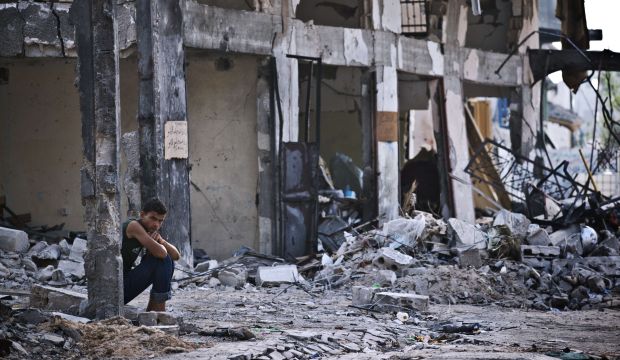
A Palestinian man sits amid the rubble of a destroyed building in Beit Hanoun in the northern Gaza Strip, on August 14, 2014. (AFP Photo/Roberto Schmidt)
Ramallah, Asharq Al-Awsat—The head of the Palestinian delegation in Cairo, Azzam Al-Ahmad, announced the beginning of a five-day truce between Israel and Hamas on Wednesday evening, after indirect talks between the two sides in the Egyptian capital. However, the ceasefire extension appeared in doubt on Thursday as Israeli forces struck targets in Gaza in response to earlier rocket attacks.
Ahmad told journalists in Cairo that the new truce “will be 120 hours long, which is five days,” and will start at midnight Wednesday local time. He added that more time was needed to discuss a number of contentious issues with Israel to reach an agreement to put an end to the month-long fighting, which has so far claimed almost 2,000 lives, most of them Palestinian civilians.
Another member of the negotiations team, speaking to Asharq Al-Awsat on condition of anonymity, said that the two sides agreed on most issues but there were still some sticking points to be worked out, including Hamas demands that Israel’s economic blockade of the territory be lifted. He added that the Israeli demand that Hamas be disarmed was not discussed.
A source close to the Palestinian delegation, also speaking to Asharq Al-Awsat on condition of anonymity, said: “There is an American proposal to establish a seaport in Gaza on condition that its operations are monitored. This will be a floating port opposite the Cyprus coast, in order to inspect the goods which will be delivered to Gaza.”
He said the proposal was still under discussion in the indirect negotiations between the Palestinian and Israeli delegations in Cairo.
“The Arab League has informed the Egyptian mediator of its willingness to form a committee which will be in charge of the reconstruction of Gaza through the Palestinian unity government, led by [President] Mahmoud Abbas,” he added.
The Palestinian diplomatic source said that the talks had, so far, focused on the mechanisms to implement the agreement and that the discussion about the airport and the seaport had been postponed until the next round of negotiations.
Sources told Asharq Al-Awsat that Hamas had rejected the opening of border crossings and an extension of the coastal zone Israel allows Gazan fishermen to work in, as well as the gradual clearing of the exclusion zone. The Islamist group also rejected the postponement of discussions regarding the establishment of sea and airports not backed with tangible guarantees, because it sees such measures as a case of “reorganizing the siege, not lifting it.”
Hamas also rejected linking the ceasefire with the issue of the remains of Israeli soldiers held by the movement, the source said. Israel, for its part, insisted on linking the agreement to the issue of the bodies of soldiers and the disarming of Hamas. Israel also refused out of hand to discuss the issue of the sea and airports.
Egypt presented both parties with a proposal to postpone discussions on the establishment of sea and airports for one month after the ceasefire, and after a guarantee of a return to normality in Gaza.
The Egyptian proposal also suggested the postponement of discussions of the release of Palestinian prisoners and the bodies of two Israeli soldiers for a short time. It also suggested the reopening of Gaza’s border crossings and allowing reconstruction materials into the territory, according to regulations jointly agreed on by Israel and the Palestinian Authority.
The issue of the Rafah Border Crossing will be discussed between Egypt and the Palestinians separately.
The Israeli delegation returned to Cairo on Wednesday following talks in Israel. An Israeli official said “members of the Israeli delegation talked about progress in the talks which took place yesterday but without achieving a breakthrough.”
Speaking on condition of anonymity, the official said: “The Israeli delegation will express Israel’s desire to extend the truce, which ends at midnight, in the event a final agreement has not been reached.”
Israeli Foreign Minister Avigdor Lieberman, meanwhile, rejected any agreement with Hamas. He said on Wednesday: “The war in the south must be decided and the movement must be destroyed . . . Israel cannot return to depending on the PA President Mahmoud Abbas, because Abbas [has] lost legitimacy since 2006, and therefore, new elections must be held in the PA after quashing Hamas.”
Israeli officials cast doubts over the possibility of reaching agreement if Hamas insisted on its conditions. Security Minister Yitzhak Aharonovitch said: “Hamas is making unreasonable demands such as establishing a port in Gaza and the release of prisoners, but at the same time it rejects the idea of disarming Gaza and the return of the bodies of the two missing soldiers.”
Aharonovitch added: “Hamas must accept a formula of reconstructing Gaza in return for disarming it, and if Hamas rejects that, the war must continue until it is decided in order to guarantee permanent peace for the citizens.”
Israeli Intelligence Affairs Minister Yuval Steinitz, meanwhile, said “the disarming of Hamas will be an essential condition to restart the peace talks to achieve a permanent solution to the crisis.”
